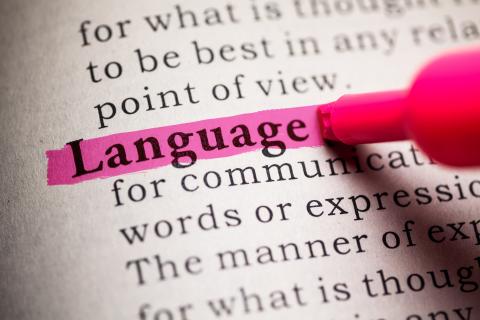She's Nobody Special
"Language isn't meant to alienate us. It's meant to help us understand one another." – Rakshitha Arni Ravishankar

I started the second grade at eight years old in 1969—my first opportunity to attend public school. My parents were strong advocates for me, and in those days, it was rare to see someone with a disability in public school. Because I started school late, I was in the same freshman class as my younger brother, David, as well as the same algebra class. I missed out on my first week of school while all of my teachers attended workshops on how to teach students with disabilities.
When my brother came home from his first day of school, I asked him about it. He said “Damn you! You already got me in trouble!” I was shocked and asked how I could do that when I wasn’t even there. David explained, “Well, the teacher stood there and told everyone that we are going to have a ’special’ student joining class next week.” My brother stood up and said, “You all know my sister, Kathy, and you know she’s just like any other kid; she’s nobody ‘special’!” This story may seem funny now, but, at the time, I was thankful that my brother had my back. Even then, we understood that the word “special” signaled that I was different and separate from my peers.
Many euphemisms have been used in place of the word “disability” or “disabled." A euphemism is a word or phrase that is vague and considered to be more pleasant and less offensive. Some examples include special needs, handi-capable, challenged, differently abled, consumer, and (New Hampshire’s favorite) self-advocate. I find all of these expressions cringe-worthy because they are simply not accurate.
I want everyone to understand that it is okay to use the word “disability” or refer to a specific disability if it is important to the message you are trying to convey. Disability is not right or wrong—it just is.
It is a natural part of the human experience. About one in four adults in the United States (26%) identify as disabled. We all have the same basic needs. The difference between my needs and someone who is not disabled is in the way those needs are met. For instance, we all need sleep, but I need assistance getting into bed. My need to sleep is not “special” at all.
In 2010, President Barack Obama signed Rosa’s Law which replaced the term “mental retardation” with “intellectual disability” in all United States federal laws. Nine-year-old Rosa Marcellino and her family advocated for this change. The online campaign, “Spread the Word to End the Word,” asked people to sign a pledge not to use the R-word. It also helped people understand why it is such a disrespectful word, especially when used as an insult. The campaign resulted in over one million people accepting this challenge. While it is wonderful that the R-word is not used as frequently in school, it is sometimes replaced with “special ed” or “SPED,” which can be used as an insult. It refers to someone who is less than.
When we label a student as someone who has “special needs,” it can lead to misunderstandings and risks implying that the student is entitled, privileged, or spoiled. In school, one of the main goals of students is to figure out how they fit in. There is a lot of stigma involved with any type of disability, and adding more labels only makes things more difficult for them.
From time to time, every student needs individualized instruction. That is why Universal Design for Learning (UDL) is important for all students. UDL is a framework developed to improve teaching and learning for everyone regardless of grade level. It is based on the concept that there is no such thing as an average student. So if we design for the student that needs a little extra help, as well as the student who needs to be challenged, we will also meet the needs of learners that fall somewhere in the middle.
Flexibility and choice are at the core of UDL. Students are given the opportunity to take some responsibility for what they are learning. Instructors can teach to their strengths and students can learn in a style that works best for them. The goal of UDL is to help students become motivated, independent problem solvers, and there is less need for accommodations because everyone has the freedom to make choices about how and what they learn. If you think about it, since students play such a significant role in their education, everyone is receiving a “special education.”
From where I sit, all of these euphemisms (which must have been created by people who don’t live with disabilities) attempt to cleverly avoid saying the word “disability.” But why should I be embarrassed about my disability? It is a part of who I am, and I am willing to own that. I am not saying that people aren’t “special,” because, of course, we all have someone special in our lives (or at least I hope we do). I just don’t think that it has anything to do with our disabilities. It has to do with our relationships and the connections we share with one another.